The indigenous experience is similar, be it in Bangladesh or Canada

Aluk Fontaine Richardson is of Anishinaabe, Cree, and Mi'kmaq heritage, and is a proud member of Sagkeeng First Nation. She works as a junior research analyst for Apoqon Consulting, an Indigenous consultancy firm in Canada, and is the co-founder and co-director of Realize Radicalization. As the recipient of the Bangabandhu Peace Philosophy and World Peace Scholarship, Fontaine Richardson also travelled to Bangladesh for research on the Chittagong Hill Tracts Peace Accord, its impact on Indigenous peoples, and its applicability to the reconciliation journey of Indigenous peoples in Canada. In an interview with Eresh Omar Jamal of The Daily Star, she talks about her experience of learning about the Indigenous people of CHT and how their plight relates to that of the Indigenous people of Canada.
What inspired you to come to Bangladesh and do research on the CHT Peace Accord and its impacts on the Indigenous people living in the Hill Tracts?
Researching the plight of Indigenous people is a passion of mine because I am Indigenous. I grew up in the culture, my grandfather was a chief and a politician who negotiated the largest class-action lawsuit in Canadian history with the Canadian government on behalf of residential schools. I felt it was part of a natural evolution that I got interested in it. I guess from having a lived experience, in my opinion and my experiences here talking to Indigenous people, the best authority on anything is the people themselves. I think ultimately, which is part of the reason I am here too, there is so much commonality in the Indigenous experience everywhere, no matter where you are – whether you are in Bolivia, Canada, or Bangladesh – the experiences of colonisation and marginalisation parallel each other, even though the context may be different.
Because it is not something we often hear about, could you give us a brief background of the Canadian situation?
When the Europeans first arrived – the French and the British – it was more of a nation-to-nation relationship between them and the people already living in Canada. Initially there were treaties among nations, which led to a lucrative fur trade. There were some impacts, like the Europeans introduced diseases that Indigenous people were not used to, and other issues related to Christianity. But then, as more European settlers started to come to Canada, all the Indigenous land became their land. Ultimately, the British became the main colonisers because they won a war against the French.
The (British) Canadian government started to negotiate treaties with the Indigenous people. And there are a lot of misconceptions about those treaties. The Indigenous people, when they were signing the treaties, didn't realise they were surrendering the land. They thought they were sharing the land.
A lot of the treaties haven't been realised to this day. A lot of the terms and conditions are still blurry between the parties – we can't really agree on which interpretations of those treaties to accept, the European or Indigenous concept of it.
In 1867, when the Dominion of Canada was officially born, the Indian Act, which is still around today, was introduced. And its purpose was to essentially assimilate the Indigenous people, because once they couldn't offer as much economically but held on to land, they became more of a threat who had to be converted into Christian, more mainstream, Euro-Canadians. That is when things really shifted. Everything became administered under the Indian Act. And the biggest thing it introduced were residential schools, whose purpose was to kill the Indian in the child – to kill their identity.
The conditions in those schools were very bad. An estimated 4,000-6,000 children died in those schools because they were overcrowded, severely underfunded, and the kids were working in unsafe conditions, while their nutrition wasn't good because the Canadian government didn't want to be spending a lot on what they hoped would be a speedy assimilation project.
Why did the children have to work there?
Well, the Europeans viewed Indigenous people as being lazy, since we had a different philosophy and system of living. They thought Indigenous people had to fit into Canadian society and they were going to do that by giving them some work skills. So, kids as young as four and up to 16 were sent to residential schools, and were made to work.
Another huge part of the grand Canadian assimilation policy towards Indigenous people was the sixties scoop, which made it very easy for the child welfare system to take away Indigenous kids. Thousands of them were sent to white middle-class families, which had the same impact as residential schools, as they were completely torn away from their culture and separated from their families. That caused a lot of issues for Indigenous people, including mental health problems.
Has the Canadian government acknowledged the wrongs that were done against the Indigenous population and taken any steps to rectify those past mistakes?
Yes, definitely. And I have to commend the Canadian government for that. In 2006, Prime Minister Stephen Harper personally apologised to the Indigenous community on national television, and that was a huge acknowledgment for Indigenous people. Like I said before, my grandfather negotiated a class-action lawsuit, and that gave survivors money and also established the Truth and Reconciliation Commission, which was modelled after the South African apartheid model, where people could investigate the crimes that were committed. So a lot of positive things have happened and are happening, but many of these processes are going to take some time to get sorted.
Having studied the situation in the CHT, and with your background, what are some of the comparisons that you'd make?
Indigenous people throughout the world have experienced marginalisation and oppression – that is just a fact. The socio-economic disparity between the mainstream society and Indigenous people here is very much like what we have in Canada. The education level is much lower, the poverty rate is much higher, so by any socio-economic metrics they are doing worse off in both countries. Another thing too I see is the erosion of Indigenous self-determination here, similar to Canada.
When the British first colonised the area, they had some level of autonomy with the CHT manual – they had their own traditional systems of governance. And then gradually with the Pakistan government and then unfortunately with the Bangladesh government, that kind of right to self-determination has become quite eroded. It is the same type of thing that happened in Canada, only hundreds of years ago. So, in a sense, the comparison is quite interesting, seeing how recently that colonisation has impacted Indigenous people here, because the Bangladesh state is a lot younger than the Canadian state, we are basically just seeing colonisation happen in a different time than in Canada.
But I want to add that the framework of the CHT Peace Accord is really good. The things that it has about self-determination and the establishment of district and hill councils are a step in the right direction. And the fact that there has been some level of autonomy afforded in theory to Indigenous people vis-a-vis the Accord has been great, because I know that things were really bad between the 1970s and the 1990s, especially through land disposition, etc.
When Bangladesh itself was established, the constitution left no room for Indigenous people. You could say there was almost this imposition of culture here, where there was no room for Indigenous people to carve out their own space, they were kind of subsumed under the larger identity of being Bangladeshi – as well as not having their languages officially recognised, which is the same as in Canada.
From your experience with them, would you say inclusion in the constitution is something the Indigenous people would want?
I think people would like recognition of them. They want recognition of their self-determination – that does not mean they want to secede from the country.
The framework of the Accord itself I think is very promising. The level of autonomy it grants Indigenous people is great. I know not everyone will be happy with it, but I think it's a real step in the right direction. I know it's been 24 years since the Accord was signed, and it is yet to be fully implemented, but it is an ongoing thing – things didn't happen overnight in Canada, either. It took many years for people to even talk about residential schools, never mind give people compensation. It took years for the Canadian government to admit they may have violated treaty rights. So, you can't expect a country that has only been around since 1971 to have fully implemented all of this, especially while grappling with so much struggles like in the '70s and '80s.
Don't you think its kind of doubly ironic for us, who were victims of colonisation, to somewhat continue treating the people of CHT similar to what both our colonisers treated them like?
I think something we see happening often is that people who are victims, becoming victimisers. When you have experienced hurt and marginalisation, it is a terrible feeling, but then it becomes almost second nature to you, without you even realising that you are doing it – because of what you have experienced. I think a state is the same way. Ultimately, a state is made up of people, and the people of Bangladesh have been so oppressed, even in recent history.
But I think the fact that the people here were victims of colonisation will, to a certain extent, help inform their relationship with Indigenous people. Because at a certain point I think people will realise that the same processes are happening with Indigenous people – yes, they are being marginalised like we were. There will hopefully be a lot of outpouring of empathy because the people here have experienced so much marginalisation because of their culture and their language, which is the same thing that is still happening to Indigenous people.
Would you say it would be fair to say that Canada can perhaps learn from the CHT framework, and we can learn from the Canadian government's willingness to acknowledge the mistakes made in regards to Indigenous population and how to follow through with the implementation phase?
Yes, that is exactly why I came here, because I wanted to establish this kind of knowledge-sharing. Maybe in Canada we don't always know what is best, and the same is true for here. But we can learn from each other, and we can do so much better when it comes to Indigenous groups.
I think we can learn a lot from the peace Accord, especially with the degree of autonomy that the framework recognises and the other initiatives like the Land Commission that the Accord establishes. And maybe the people of Bangladesh can learn from Canada the part of actualising the Accord agreement.

 For all latest news, follow The Daily Star's Google News channel.
For all latest news, follow The Daily Star's Google News channel. 







Comments